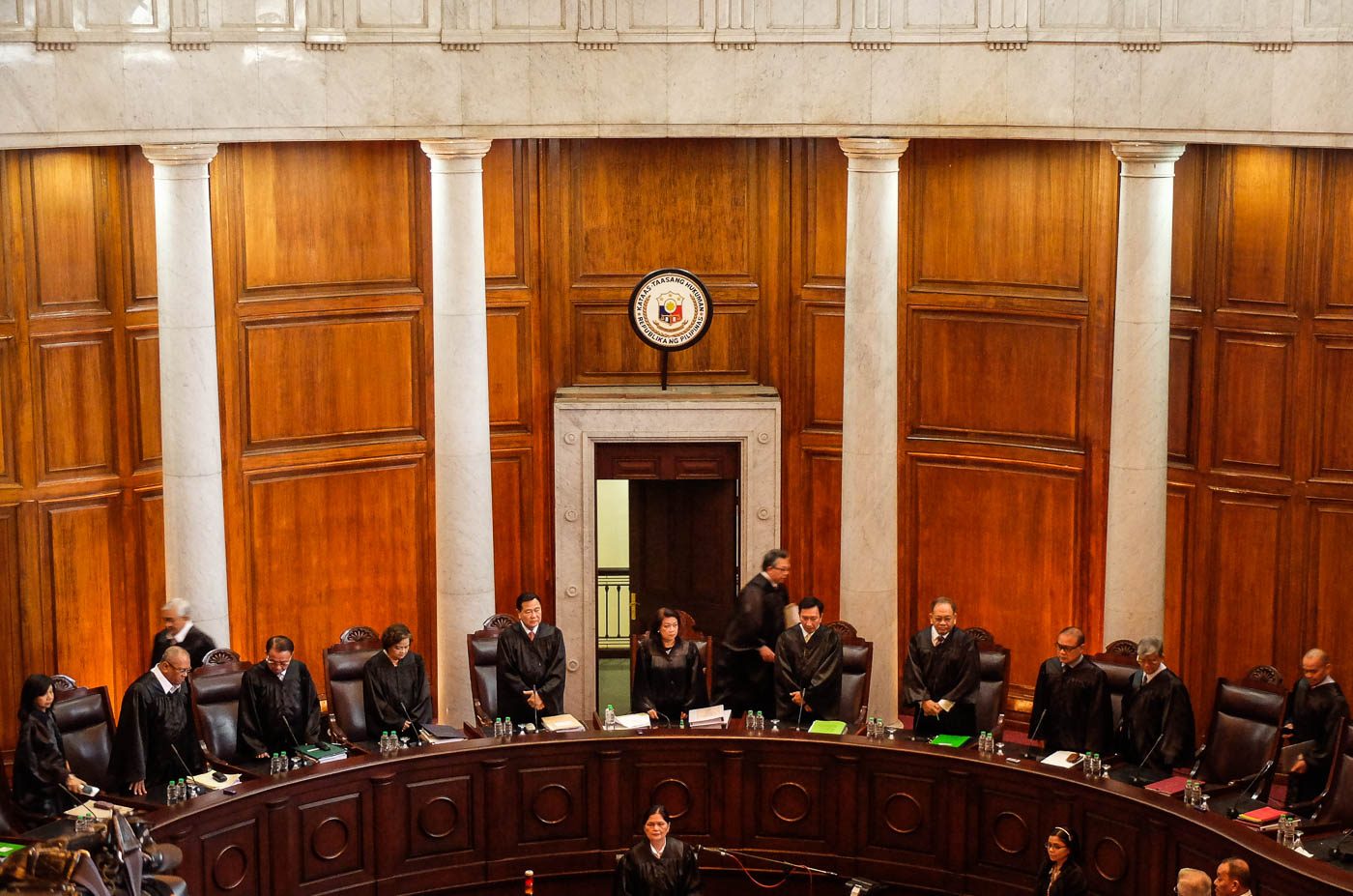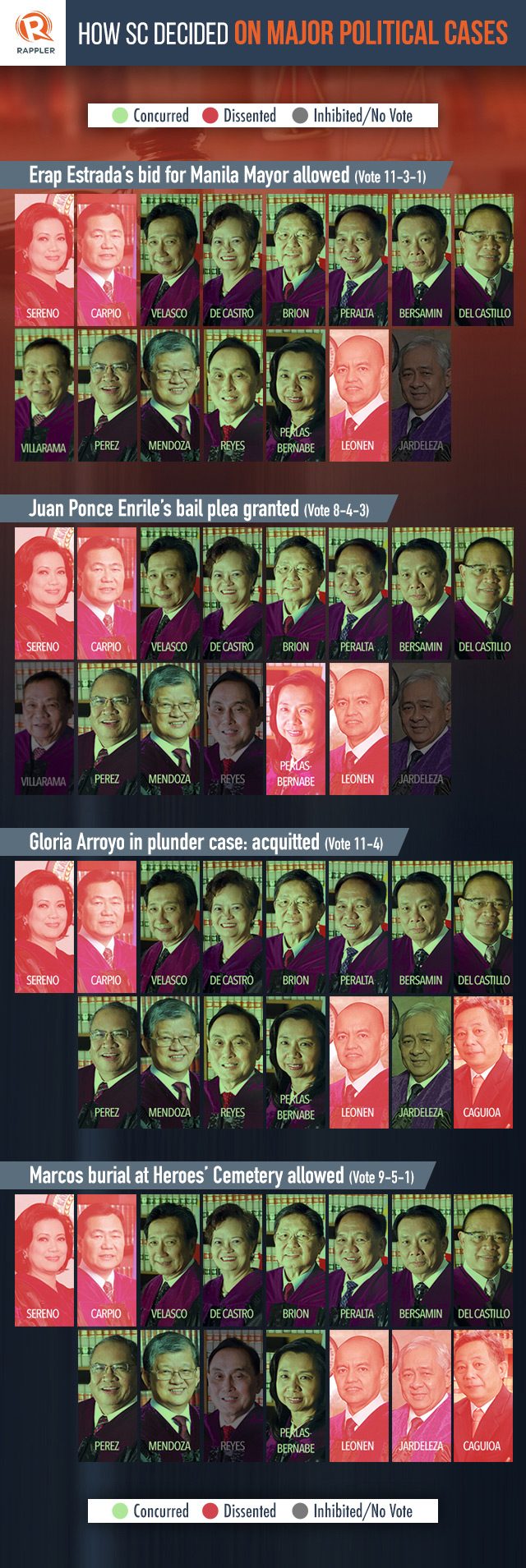SUMMARY
This is AI generated summarization, which may have errors. For context, always refer to the full article.

MANILA, Philippines – The Supreme Court has decided.
In a 9-5-1 vote, the SC on Tuesday, November 8, allowed the burial of the late president Ferdinand Marcos at the Libingan ng mga Bayani or Heroes’ Cemetery.
The decision was met with mixed reactions, with some observers turning their attention to how some justices had voted on key issues in the past.
Chief Justice Maria Lourdes Sereno, Senior Associate Justice Antonio Carpio, and Associate Justice Marvic Leonen were among the 5 justices who voted against the burial.
In an analysis hours after the verdict, Rappler’s Marites Vitug observed that the 3 justices have consistently dissented on cases that “restore old political figures”, such as in the cases involving ex-presidents Joseph Estrada and Gloria Macapagal-Arroyo, and former senator Juan Ponce Enrile.

But over the past two years, the High Tribunal has also decided on major cases involving notable politicians, from members of the Ejercito-Estrada dynasty to Grace Poe. (RELATED: How did SC justices decide key cases in 2014-2016?)
Here are some of the other major political cases and how the justices voted on each of them.

In these 5 cases, Sereno and Leonen joined the majority decision, while Carpio concurred in all, except on the question of Senator Grace Poe’s citizenship.
Justices Teresita Leonardo-de Castro and Arturo Brion joined Carpio in his opinion that Poe was not a natural-born Filipino and thus not eligible to run for president in the 2016 elections. (READ: To allow Poe’s bid is ‘mockery’ of polls – Carpio)
The SC voted 12-3 upholding Poe’s Filipino citizenship.
In the case of former senator Jinggoy Estrada, 5 of those who voted to junk the plunder and graft charges against him – Justices De Castro, Brion, Presbitero Velasco, Lucas Bersamin, and Jose Mendoza – also junked the disqualification case against his father Joseph Estrada, thus allowing him to run for public office.
However, 9 justices voted to deny Jinggoy’s petition. Justice Jardeleza inhibited due to his previous position as Solicitor General.
In his dissent, Justice Brion argued that the Ombudsman committed a “grave irregularity” in its preliminary investigation of Jinggoy’s case.
Justice Velasco echoed this in his own dissenting opinion, adding that the case should be remanded to the Ombudsman “for the conduct of another preliminary investigation.”
Condonation doctrine
Justices De Castro and Bersamin likewise dissented in abandoning the condonation doctrine.
Under the said doctrine, an elected official’s administrative offenses are already deemed forgiven when the public reelects him or her for another term.
This was invoked by Mayor Jejomar Erwin Binay Jr in his defense regarding the Ombudsman’s probe into the anomalous Makati City Hall II parking building.
Bersamin, in his concurring and dissenting opinion, argued that the controversy “does not call for the revisit of the doctrine, and does not warrant its eventual abandonment.” For the Court to persist in doing so, he added, “is to indulge in conjecture or in unwarranted anticipation of future controversies.”
He also said that it was “plain error” for the Court to decide on Binay’s case on the basis of the doctrine.
The SC voted 7-3-5 to junk the condonation doctrine. Justice Jose Perez joined the dissenters, while Justices Velasco, Brion, Diosdado Peralta, Mendoza, and Jardeleza inhibited in the case.
As for the remaining two cases, the SC upheld with a 12-0 vote the disqualification of former Laguna Governor Emilio Ramon “ER” Ejercito for poll overspending; 3 justices recused themselves from the voting. The SC also upheld with a 10-0 vote, with 5 not voting, the power of the Court of Appeals to review orders by the Office of the Ombudsman. – Rappler.com
Add a comment
How does this make you feel?
There are no comments yet. Add your comment to start the conversation.